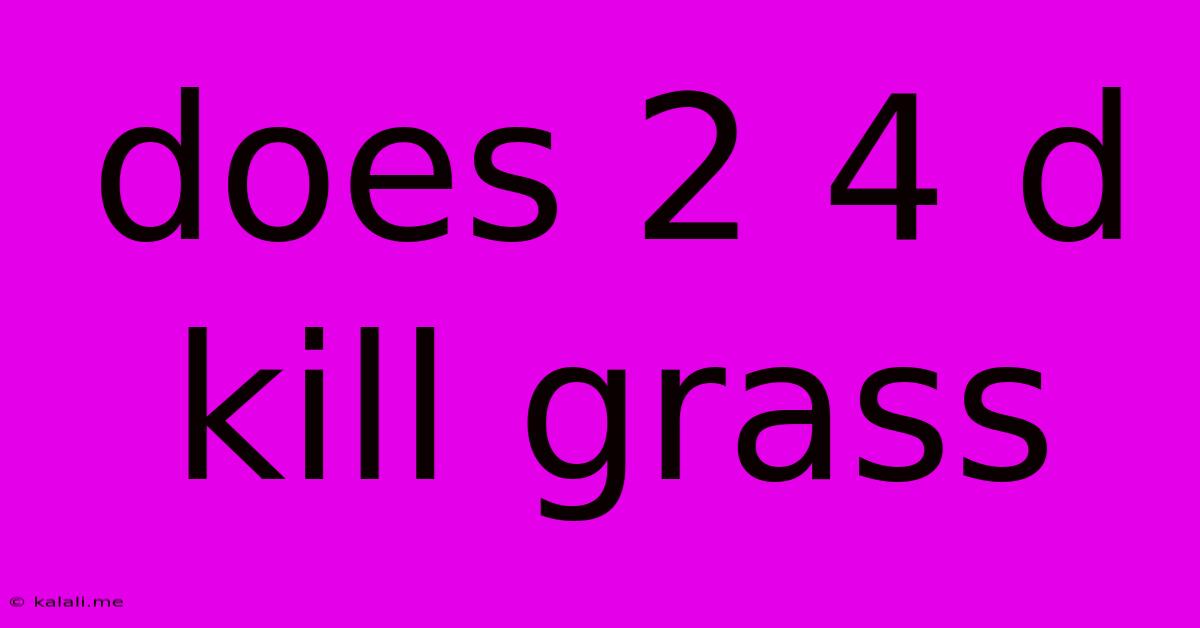Does 2 4 D Kill Grass
Kalali
Jun 07, 2025 · 3 min read

Table of Contents
Does 2,4-D Kill Grass? Understanding Selective Herbicides
This article explores the common question: Does 2,4-D kill grass? The answer is nuanced and depends on several factors, primarily the type of grass and the formulation of the 2,4-D herbicide. Understanding the nature of 2,4-D and its effects on various plant species is crucial for safe and effective weed control.
2,4-Dichlorophenoxyacetic acid, better known as 2,4-D, is a selective herbicide. This means it targets specific types of plants while leaving others unharmed. It's commonly used to control broadleaf weeds in lawns and other turfgrass areas. But does that mean it's harmless to all grasses? Let's delve deeper.
How 2,4-D Works
2,4-D works by disrupting the growth hormones in plants. Broadleaf weeds are more susceptible to this disruption than grasses. The herbicide is absorbed through the leaves and stems of the plant, causing rapid growth and eventually leading to the weed's death. This process can vary depending on factors like:
- Concentration: Higher concentrations of 2,4-D are naturally more effective but also pose a higher risk of harming desirable plants.
- Formulation: 2,4-D comes in various formulations, including esters and amines. Ester formulations are generally faster-acting but can be more volatile and drift more easily in the wind. Amine formulations are less volatile, making them a safer choice in certain situations.
- Weather conditions: Hot, dry, or windy conditions can increase the risk of damage to non-target plants, including grasses. Applying 2,4-D on a calm, overcast day is generally recommended.
- Application method: Proper application is vital. Using the correct equipment and technique helps to ensure that the herbicide reaches its intended target without harming surrounding vegetation.
Types of Grass and 2,4-D Sensitivity
While 2,4-D is designed to spare grasses, the effect can vary. Some grasses are more tolerant to 2,4-D than others. Certain grass species might exhibit some level of sensitivity to higher concentrations or under specific environmental conditions. Over-application or application under stressful conditions for the grass (drought, heat) can increase the risk of damage even to usually tolerant species.
When 2,4-D Might Harm Grass
Several scenarios increase the likelihood of 2,4-D negatively impacting grass:
- Over-application: Applying more 2,4-D than recommended can damage even the most tolerant grasses. Always follow the instructions on the product label carefully.
- Young or stressed grass: Newly seeded or established grass is more vulnerable to herbicide damage. Avoid applying 2,4-D to these areas. Similarly, grass under stress from drought or disease is more susceptible.
- Improper application: Spray drift, run-off, or contact with the grass's crown can cause damage. Using appropriate equipment and techniques is crucial to avoid these issues.
- Incompatible mixtures: Mixing 2,4-D with other herbicides or pesticides can potentially increase its toxicity to grasses. Always check the compatibility before mixing.
Conclusion: Careful Application is Key
In summary, while 2,4-D is a selective herbicide primarily designed to control broadleaf weeds, it can harm grasses under certain conditions. Careful application, following label instructions, choosing the right formulation, and considering environmental factors are crucial for preventing damage to your lawn. If you're unsure about using 2,4-D, consulting a professional lawn care specialist is always recommended. Remember that responsible herbicide use minimizes environmental impact and protects desirable vegetation.
Latest Posts
Latest Posts
-
Old Bathtub Drain Stopper When Standing Waste Does Not Work
Jun 07, 2025
-
Truth Table With P Then Q
Jun 07, 2025
-
What Is Shorthand For 1 2 3 4
Jun 07, 2025
-
Now The Day Bleeds Into Nightfall
Jun 07, 2025
-
Where Does L Cysteine For Bread Come From
Jun 07, 2025
Related Post
Thank you for visiting our website which covers about Does 2 4 D Kill Grass . We hope the information provided has been useful to you. Feel free to contact us if you have any questions or need further assistance. See you next time and don't miss to bookmark.